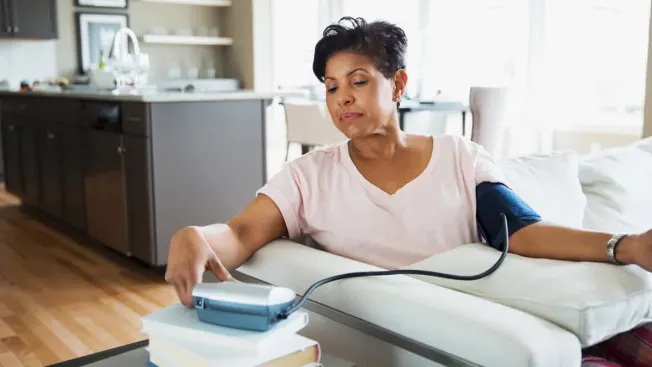High blood pressure, or hypertension, is a common condition that affects millions of people worldwide. Left untreated, it can lead to severe health issues such as heart disease, stroke, and kidney failure. While medication is a common treatment, many people seek to manage their blood pressure through lifestyle changes and natural methods. This article will explore effective strategies for controlling blood pressure without medication, focusing on diet, exercise, stress management, and other holistic approaches.
Understanding Blood Pressure
Blood pressure is the force exerted by circulating blood on the walls of the body’s arteries. It is measured in millimeters of mercury (mmHg) and recorded as two numbers: systolic pressure (the higher number) and diastolic pressure (the lower number). A normal blood pressure reading is typically around 120/80 mmHg. Hypertension is diagnosed when readings consistently exceed 130/80 mmHg.
SEE ALSO: What Is The Danger Zone for Low Blood Pressure
Dietary Approaches
Adopt the DASH Diet
The Dietary Approaches to Stop Hypertension (DASH) diet is specifically designed to help manage blood pressure. This diet emphasizes the consumption of fruits, vegetables, whole grains, lean proteins, and low-fat dairy products while limiting salt, red meat, and added sugars. Key components include:
Fruits and Vegetables: Aim for 4-5 servings of each per day. These foods are rich in potassium, which helps balance sodium levels in the body.
Whole Grains: Include whole grains such as brown rice, oats, and whole wheat bread. These provide fiber, which is beneficial for heart health.
Lean Proteins: Opt for lean meats, poultry, fish, and plant-based proteins like beans and legumes.
Low-Fat Dairy: Incorporate low-fat or fat-free dairy products to reduce saturated fat intake.
Reduce Sodium Intake
Excessive sodium consumption is linked to high blood pressure. The American Heart Association recommends limiting sodium intake to 2,300 milligrams (mg) per day, with an ideal limit of 1,500 mg for most adults. Tips for reducing sodium include:
Read Labels: Check nutrition labels for sodium content and choose lower-sodium options.
Cook at Home: Preparing meals at home allows you to control the amount of salt used.
Use Herbs and Spices: Flavor food with herbs, spices, and citrus instead of salt.
Increase Potassium Intake
Potassium helps counteract the effects of sodium and can lower blood pressure. Foods rich in potassium include:
- Bananas
- Oranges
- Potatoes
- Spinach
- Avocados
Limit Alcohol Consumption
Drinking too much alcohol can raise blood pressure. If you choose to drink, do so in moderation. This means up to one drink per day for women and up to two drinks per day for men.
Physical Activity
Regular Exercise
Regular physical activity is crucial for managing blood pressure. Exercise helps strengthen the heart, enabling it to pump blood with less effort, thereby reducing pressure on the arteries. Recommended activities include:
Aerobic Exercise: Engage in activities like walking, jogging, cycling, or swimming for at least 150 minutes per week.
Strength Training: Incorporate strength training exercises at least two days per week to improve overall cardiovascular health.
Flexibility and Balance Exercises: Practices such as yoga and tai chi can enhance physical stability and reduce stress.
Maintain a Healthy Weight
Weight management is vital for blood pressure control. Excess weight can increase the risk of hypertension, while losing even a small amount of weight can significantly reduce blood pressure. Focus on achieving and maintaining a healthy body mass index (BMI) through a balanced diet and regular exercise.
Stress Management
Practice Relaxation Techniques
Chronic stress can contribute to high blood pressure. Implementing relaxation techniques can help manage stress levels and promote overall well-being. Effective methods include:
Deep Breathing: Practice deep breathing exercises to reduce stress and lower blood pressure.
Meditation: Regular meditation can help calm the mind and decrease stress.
Progressive Muscle Relaxation: This technique involves tensing and then slowly releasing different muscle groups to reduce tension.
Prioritize Sleep
Adequate sleep is essential for maintaining healthy blood pressure levels. Aim for 7-9 hours of quality sleep per night.
Establish a regular sleep schedule and create a restful environment to improve sleep quality.
Lifestyle Modifications
Quit Smoking
Smoking is a significant risk factor for hypertension and cardiovascular disease. Quitting smoking can improve heart health and lower blood pressure. Seek support from healthcare professionals, support groups, or smoking cessation programs to help quit.
Reduce Caffeine Intake
While the effects of caffeine on blood pressure can vary, it is advisable to limit intake, especially if you are sensitive to its effects. Monitor your blood pressure response to caffeine and adjust your consumption accordingly.
Monitor Blood Pressure at Home
Regularly monitoring blood pressure at home can help track progress and identify potential issues early. Use a reliable home blood pressure monitor and keep a log of readings to share with your healthcare provider.
Stay Hydrated
Proper hydration is essential for maintaining healthy blood pressure levels. Aim to drink at least 8 glasses of water per day.
Dehydration can cause blood vessels to constrict, leading to an increase in blood pressure.
Alternative Therapies
Herbal Supplements
Certain herbal supplements have shown promise in managing blood pressure. However, it is essential to consult with a healthcare provider before starting any supplement, as they can interact with medications or have side effects. Some supplements to consider include:
Garlic: Known for its cardiovascular benefits, garlic may help lower blood pressure.
Hibiscus: Hibiscus tea has been associated with reduced blood pressure levels.
Omega-3 Fatty Acids: Found in fish oil, omega-3s can improve heart health and lower blood pressure.
Acupuncture
Acupuncture, a traditional Chinese medicine practice, involves inserting thin needles into specific points on the body. Some studies suggest that acupuncture can help reduce blood pressure, possibly by influencing the body’s stress response and improving blood flow.
Conclusion
Controlling blood pressure without medication involves a multifaceted approach that includes dietary changes, regular physical activity, stress management, and lifestyle modifications. By adopting these strategies, individuals can effectively manage their blood pressure and improve their overall health.

